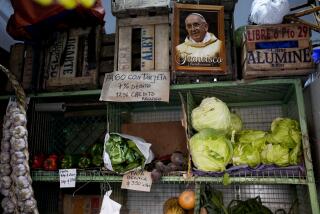Venezuela Imposes Controls to Check Runaway Inflation : South America: Certain rights are suspended. Government will set maximum prices on some basic items.
- Share via
CARACAS, Venezuela — Facing the possibility of 70% inflation by the end of the year, Venezuelan President Rafael Caldera suspended some constitutional rights late Monday to impose price and currency exchange controls.
The government suspended five constitutional guarantees, including protection against unreasonable searches, in order to impose the controls and prepare, if necessary, for public unrest, a government spokesman said.
The move allows the government to set maximum prices for certain basic products, such as food and medicine.
Venezuela is undergoing one of the worst economic crises in its history. A large portion of the banking system has fallen into state hands, while the bolivar, the national currency, has plummeted in foreign exchange markets.
Inflation was 5.2% in May, one of Latin America’s highest rates, and it is expected to reach an annual rate of 70% by the end of 1994.
“The grave state of our financial system, the insistent wave of rumors, the speculative movements that have tried to bring down the bolivar have forced us to take these measures,” Caldera said in a nationwide television address.
To soften the effects of inflation, the government will issue transportation and food bonds to low-income residents, Caldera said. More measures will be announced soon, he said.
By government estimate, 8 million of the country’s 20 million people live in poverty. Public schools, roads, hospitals and other services are falling apart; real incomes and living standards are shrinking.
Caldera said he does not believe the measures will scare off foreign investors. “On the contrary, investors need a stable currency,” he said.
The government will also seek tighter regulation of commercial banks, Caldera said.
More to Read
Sign up for Essential California
The most important California stories and recommendations in your inbox every morning.
You may occasionally receive promotional content from the Los Angeles Times.










